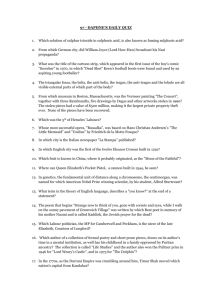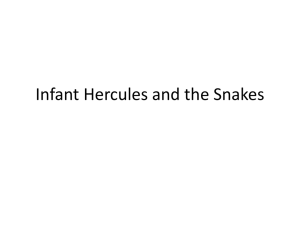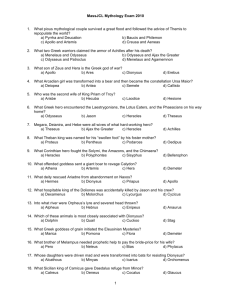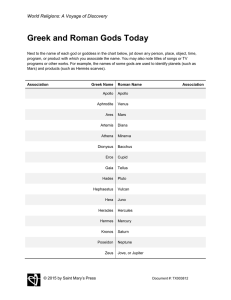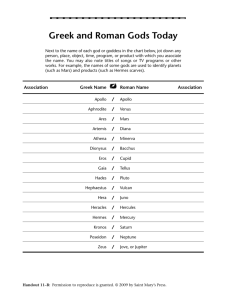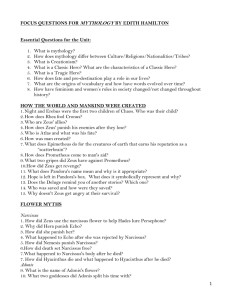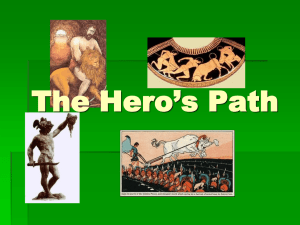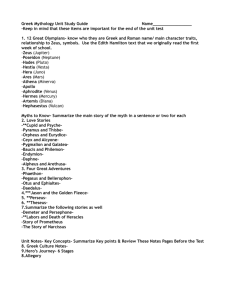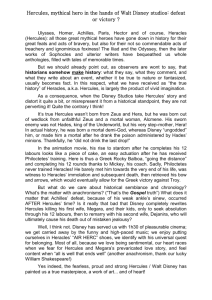Heracles (Hercules): The Twelve Labors Summary
advertisement
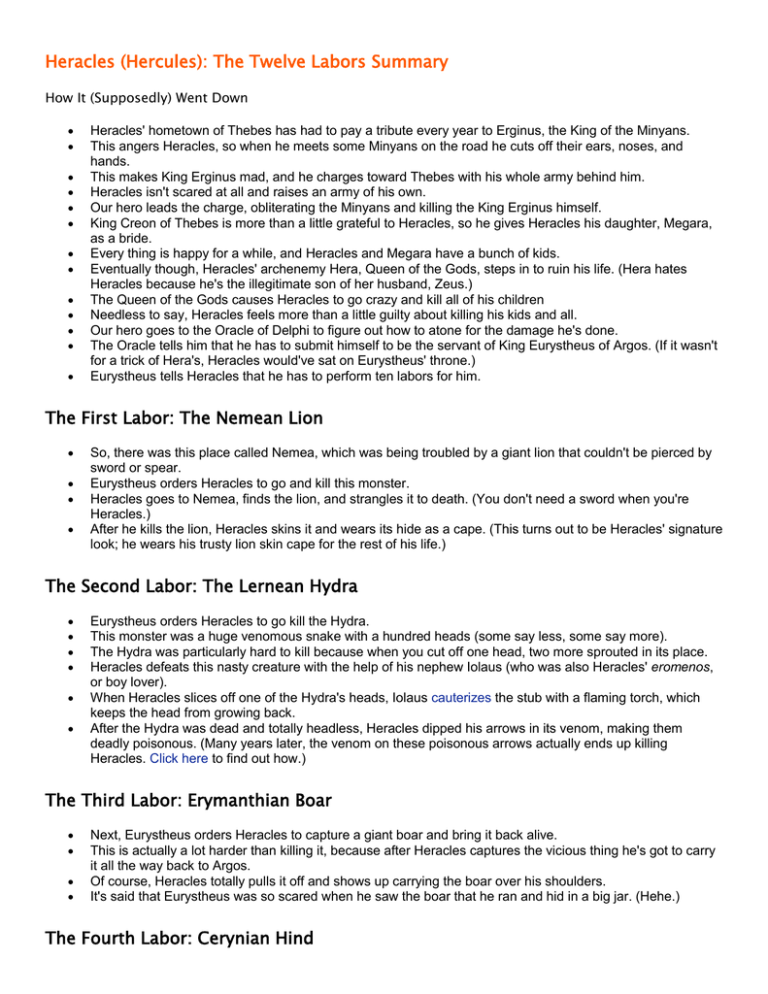
Heracles (Hercules): The Twelve Labors Summary How It (Supposedly) Went Down Heracles' hometown of Thebes has had to pay a tribute every year to Erginus, the King of the Minyans. This angers Heracles, so when he meets some Minyans on the road he cuts off their ears, noses, and hands. This makes King Erginus mad, and he charges toward Thebes with his whole army behind him. Heracles isn't scared at all and raises an army of his own. Our hero leads the charge, obliterating the Minyans and killing the King Erginus himself. King Creon of Thebes is more than a little grateful to Heracles, so he gives Heracles his daughter, Megara, as a bride. Every thing is happy for a while, and Heracles and Megara have a bunch of kids. Eventually though, Heracles' archenemy Hera, Queen of the Gods, steps in to ruin his life. (Hera hates Heracles because he's the illegitimate son of her husband, Zeus.) The Queen of the Gods causes Heracles to go crazy and kill all of his children Needless to say, Heracles feels more than a little guilty about killing his kids and all. Our hero goes to the Oracle of Delphi to figure out how to atone for the damage he's done. The Oracle tells him that he has to submit himself to be the servant of King Eurystheus of Argos. (If it wasn't for a trick of Hera's, Heracles would've sat on Eurystheus' throne.) Eurystheus tells Heracles that he has to perform ten labors for him. The First Labor: The Nemean Lion So, there was this place called Nemea, which was being troubled by a giant lion that couldn't be pierced by sword or spear. Eurystheus orders Heracles to go and kill this monster. Heracles goes to Nemea, finds the lion, and strangles it to death. (You don't need a sword when you're Heracles.) After he kills the lion, Heracles skins it and wears its hide as a cape. (This turns out to be Heracles' signature look; he wears his trusty lion skin cape for the rest of his life.) The Second Labor: The Lernean Hydra Eurystheus orders Heracles to go kill the Hydra. This monster was a huge venomous snake with a hundred heads (some say less, some say more). The Hydra was particularly hard to kill because when you cut off one head, two more sprouted in its place. Heracles defeats this nasty creature with the help of his nephew Iolaus (who was also Heracles' eromenos, or boy lover). When Heracles slices off one of the Hydra's heads, Iolaus cauterizes the stub with a flaming torch, which keeps the head from growing back. After the Hydra was dead and totally headless, Heracles dipped his arrows in its venom, making them deadly poisonous. (Many years later, the venom on these poisonous arrows actually ends up killing Heracles. Click here to find out how.) The Third Labor: Erymanthian Boar Next, Eurystheus orders Heracles to capture a giant boar and bring it back alive. This is actually a lot harder than killing it, because after Heracles captures the vicious thing he's got to carry it all the way back to Argos. Of course, Heracles totally pulls it off and shows up carrying the boar over his shoulders. It's said that Eurystheus was so scared when he saw the boar that he ran and hid in a big jar. (Hehe.) The Fourth Labor: Cerynian Hind Now the wimpy king orders Heracles to capture an incredibly fast deer with golden horns. Some say that Heracles snared the deer with nets, others say he pounced on it while it was asleep, and still others say that he just ran behind it until it got too tired to run anymore. No matter who you talk to, though, everybody agrees that Heracles caught the hind and brought it back to Eurystheus. The Fifth Labor: Augean Stables Okay, so this Labor is totally gross. Heracles has to go to the stables of a dude named Augeas, who apparently had more oxen than anybody else in the world, but had also never bothered to clean up after them. Yep, that's right. The Augean stables are filled with massive amounts of dung, and guess who has to clean it up? Heracles manages to pull this off by diverting the course of the Alpheius River, which washes through the stables and takes away all the poo. The Sixth Labor: Stymphalian Birds Heracles is ordered to go to the Stymphalian Lake and rid it of a flock of man-eating birds. Some say that he does this by making a bronze rattle, which he shakes and shakes until they're scared away. Others say that just shoots them all with his Hydra-poisoned arrows. The Seventh Labor: The Cretan Bull Next, Heracles has to travel to the island of Crete and captures the divine bull, who is said to be the father of the Minotaur, the monster that the hero Theseus later defeats. He manages this with the help of King Minos of Crete, and travels back to Greece on the back of the bull as it swims across the Mediterranean. The Eighth Labor: Horses of Diomedes Next, Heracles is sent to capture the horses of King Diomedes. "Capturing Horses," you say, "That doesn't seem too hard." Oh yeah, what if those horses just happen to be man-eaters? That's right... King Diomedes is in the habit of feeding his horses the flesh of people that get on his nerves. When Heracles shows up, though, he turns the tables and feeds Diomedes to his own horses. After that, the vicious horses chill out a bit, and Heracles takes them away. The Ninth Labor: The Belt of Hippolyte Ninth on the agenda is obtaining the belt of Hippolyte (a.k.a. Hippolyta), the queen of the Amazons. The Amazons were a tribe of warrior women, who only dealt with men when they felt like having babies. They either killed or got rid of any male children that came along and only raised the females. Heracles goes to their queen and asks her nicely for her belt. Amazingly, she agrees. However, Hera decides that this one was way too easy for Heracles, and she appears in the form of an Amazon and rallies the warrior women against Heracles. Heracles thinks Hippolyte has betrayed him and, after kicking a lot of Amazon butt, he kills her before sailing away with her belt. The Tenth Labor: Cattle of Geryon The tenth labor is a pretty intense one. Heracles has to sail all the way to an island called Erytheia, which is way out in what we now call the Atlantic Ocean. (To the ancient Greeks, this was the end of the world. They called the Atlantic "Oceanus" and thought of it as a giant river that encircled the world.) On the island of Erytheia there is a giant named Geryon, who has three bodies and three sets of legs all connected at the waist. It's Heracles' job to fetch Geryon's beautiful herd of cattle, which are colored red by the sunset. To get the job done, Heracles borrows a giant golden cup from the sun god Helios and sails across the Mediterranean to the island of Erytheia. Before he can take the cattle, Heracles has to kill the giant Erytion and his two-headed dog who guards them. After that, Geryon himself comes to fight him, but Heracles takes out the three-bodied giant with some massive whacks of his trusty club. Then Heracles herds the cattle into his golden cup-boat and sails back to Greece. The Eleventh Labor: The Golden Apples of the Hesperides Whoa, wait a minute. Didn't Eurystheus say there's only supposed to be ten labors? When Heracles gets back with the red cattle of Geryon, Eurystheus pulls a fast one on him. The wimpy king tells Heracles that he's not going to count the killing of the Hydra because Iolaus helped Heracles. He also won't count Heracles' cleaning of the Augean stables because he used a river to do it, instead of his own manpower. "Whatever," says Heracles "I can do anything." Eurystheus tells Heracles to go fetch some golden apples from the nymphs known as the Hesperides, who were said to represent the sunset. Incidentally, these golden apples were Hera's wedding gift when she married Zeus. To get the apples, Heracles enlists the help of the Titan Atlas, who is doomed by Zeus to hold the sky up on his back. Heracles tells Atlas that he'll hold the sky up for a little while if the Titan wouldn't mind fetching some of those lovely golden apples. Atlas, who is seriously sick of holding up the sky, agrees. When he comes back with the apples, however, he suggests that Heracles keep the sky on his shoulders while Atlas delivers the apples to Eurystheus. Heracles thinks this sounds suspiciously like a trick. Our hero "agrees" with Atlas, but tells the Titan to take back the sky for a second while Heracles puts a pad on his shoulders to ease his burden. When Atlas takes the sky back, Heracles says, "See ya!" and heads off with the apples. (In some versions, Atlas isn't even part of it, and Heracles has to slay a dragon with a hundred heads named Ladon to get the golden apples.) After Heracles takes the apples to Eurystheus, Athena returns the golden fruit to the Hesperides. The Twelfth Labor: Cerberus For the twelfth and final labor, Eurystheus thinks up pretty much the worst thing he can imagine: Heracles has to bring back the three-headed hellhound, Cerberus, Hades' vicious beast that guards the gates of the underworld. Heracles makes his way down under and pops in on Hades, god of the dead. While in the palace, Heracles comes across his fellow Greek hero, Theseus, and another dude name Pirithous with their butts stuck to a bench. The story goes that Theseus had pretty stupidly agreed to help his buddy, Pirithous, try to woo Persephone, Hades' wife. As punishment, Hades magically glued them to a bench. Heracles pulls with all his might and yanks Theseus from the bench, leaving only a thin layer of his bottom on bench. (Ouch.) When Heracles tries to pull Pirithous up, however, the underworld starts shaking – Hades is not happy. Heracles and Theseus ditch Pirithous and head on their way. Heracles goes before Hades and asks to borrow Cerberus for a bit, so that the hero can complete his final labor. Hades is cool with it as long as Heracles can wrestle the three-headed dog into submission without using any weapons. "No worries," says Heracles. Our hero finds Cerberus and squeezes the animal with his muscle bound arms. Cerberus bites, scratches, and puts up quite a fight, but Heracles refuses to let go. Eventually, Cerberus realizes he's been beaten and chills out. Heracles takes Cerberus back for Eurystheus to see and then returns the hellhound to Hades. With that Heracles' Twelve Labors are complete. He has finally atoned for killing his children. When he gets back to Thebes he gives his wife Megara to his friend Iolaus (hmm) and goes on his merry way. Some say that he was made immortal as a reward for completing all of the ridiculously hard tasks that Eurystheus assigned him.
